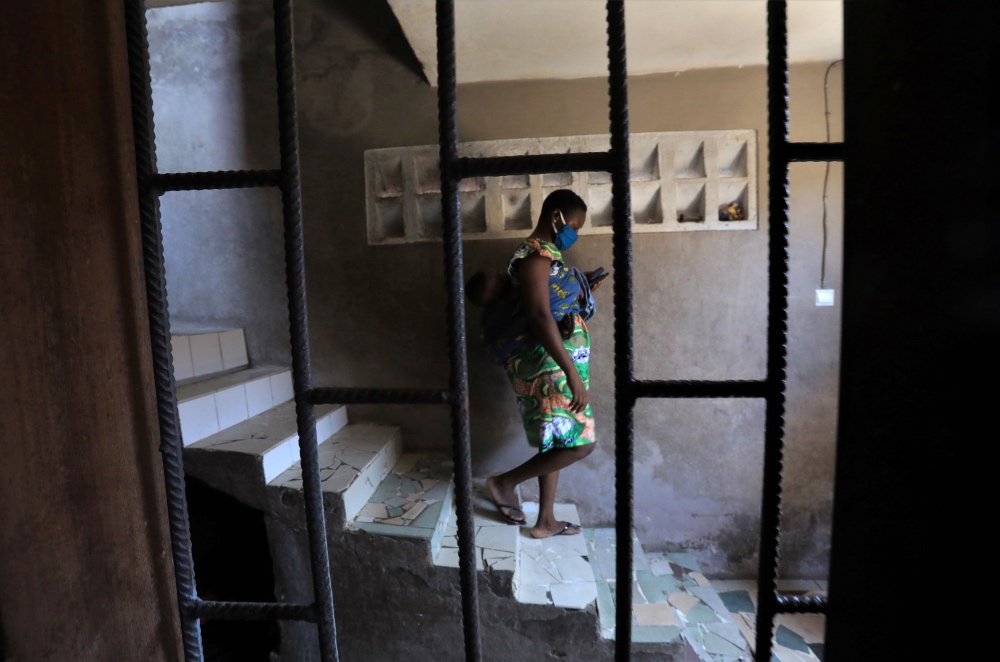London, UK
Thomson Reuters Foundation
Wealthy countries were facing mounting calls on Monday to give more funding to poorer nations to help protect the world’s most vulnerable people from the coronavirus pandemic, warning that the spread of the virus was outpacing the global response.
Oxfam called for richer nations to deliver a $US160 billion package of aid and debt relief to prevent millions of deaths from COVID-19 in the developing world where people are already battling poverty, conflict and the impacts of climate change.

A woman walks down the stairs during an outbreak of the coronavirus disease (COVID-19), in Abidjan, Ivory Coast, on 28th March, 2020. PICTURE: Reuters/Thierry Gouegnon
It warned nearly three billion people do not have access to clean water and millions do not have access to adequate healthcare and live in crowded slums or refugee camps where they cannot self isolate.
Women were expected to be hit hardest as they make up 70 per cent of health workers and carry out most unpaid care work.
Humanitarian organisations called for wealthier nations to work together to support countries with less access to healthcare and funding who are already struggling from disease, conflicts and climate related disasters:
Jose Maria Vera, interim executive director, Oxfam International
“Without urgent, ambitious and historic action, we could easily see the biggest humanitarian crisis since World War II. It’s understandable that national leaders are focused on helping their own citizens, but G20 leaders must also find the space for supporting poor nations too. We can only beat this pandemic if we act in solidarity with every country and for every person. No one is safe until we are all safe.”
António Guterres, secretary general, United Nations.
“The virus is arriving in countries already in the midst of humanitarian crises caused by conflicts, natural disasters and climate change. We must come to the aid of the ultra-vulnerable – millions upon millions of people who are least able to protect themselves. We are launching a $US2 billion global humanitarian response plan to fund the fight against COVID-19 in the world’s poorest countries.”
Francesco Rocca, president, The International Federation of Red Cross and Red Crescent Societies
“This pandemic is putting at risk entire health systems, and the situation will worsen in places where those are weak or inexistent. A strong community response is critical to stop the virus. COVID-19 affects everyone equally, but migrants and displaced people, those who are homeless, and those in disaster-prone areas are among those most exposed to infection, least able to access health care, and most impacted by loss of income. They must not be forgotten.”
Marixie Mercado, spokesperson, UNICEF
“Most critical is access to safe water and soap and 40 per cent of the world’s population the poorest and most marginalized especially, don’t have this at home. With school closures affecting more than 80 per cent of students, it is important that children are able to keep learning, and again special attention is needed for the most vulnerable children. As the pandemic and the response progress, it is also vital that other life-saving services, including immunization, are not disrupted more than absolutely necessary.”
Borge Brende, president, World Economic Forum
“COVID-19 requires everyone: large businesses, governments, NGOs and start-ups to temporarily reorientate themselves to respond to this emergency. It is crucial to support each other and the most vulnerable. This is how we will survive today and thrive tomorrow. The Forum has initiated the COVID Action Platform with 726 companies, global organizations and leaders from around the world to mobilize the private sector and act quickly.”
Simon O’Connell, executive director, Mercy Corps
“COVID-19’s spread is outpacing the global response and threatens to collapse health systems and economies worldwide. In South-East Asia and Africa, communities are particularly susceptible, especially where there are already extensive humanitarian needs because of violence, poverty, food insecurity and extreme weather. As we do all we can to increase support to these most vulnerable communities amidst huge constraints, we need donors and the international community to ensure their support is timely, flexible and truly risk-sharing.”
Lucy Beck, spokesperson, CARE
“We are scaling up our activities to ensure that clear guidance on risk, prevention and awareness of symptoms are available in the communities where we work. This includes promoting handwashing and providing soap and handwashing stations, conducting demonstrations and tackling barriers to good hygiene. We are working to ensure that critical services related to family planning and sexual health are continued, particularly as primary health resources are diverted to COVID-19 response. If coronavirus has shown us one thing it is that we are all in this together.”
Netsanet Belay, research and advocacy director, Amnesty International
“The response to this pandemic must be based on cooperation and sharing of resources, because national strategies will not be enough on their own. Not only is helping the most marginalised the right thing to do, inadequate healthcare in any part of the world is a risk to us all. The rapid spread of COVID-19 has shown how connected we all are. We will beat this virus together, for everyone, or not at all.”





